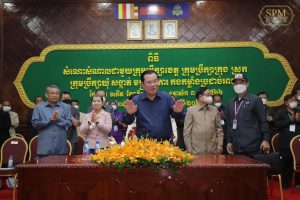Cambodia’s Hun Sen, the world’s longest serving prime minister, this week handed over power to his eldest son, having vanquished all opposition during his 38 years in power. His legacy goes beyond the country’s own borders, though it is in Cambodia that we can best understand how he has managed to subvert and defeat some key Western assumptions.
For decades, Western approaches to geopolitics have followed modernization theory, which predicts that democracy will automatically follow economic development. Modernization theory appears sensible: as an economy develops, people demand rights to protect their property and a greater say in how wealth is used. People want to elect the government that spends their taxes and hold them to account for the services they expect. Thus democracy grows.
In 1993, when Cambodia was constituting itself as a pluralist democracy and the United Nations-administered elections saw four parties elected to the National Assembly, Cambodia’s GDP was just $2.53 billion at current exchange rates. Today, three decades on, it has grown by over 1000 percent, but instead of democratic pluralism, Hun Sen’s Cambodian People’s Party controls 99.8 percent of all local councils, 100 percent of elected Senators, and 96 percent of the National Assembly.
Democracy’s highpoint was in 2013 when opposition leader Sam Rainsy returned from exile and was greeted by 100,000 people at the airport, sparking waves of rallies throughout the country. Rainsy’s Cambodian National Rescue Party (CNRP) won 44 percent of the vote in that 2013 election, an election marred by irregularities in the voter list.
After a brief period of dialogue that ended with Rainsy forced into exile abroad, Hun Sen began dismantling the pillars of democracy upon which the opposition relied. He curbed civil society, restricted trade unions, suppressed free speech, and closed independent media outlets. Then, when staring defeat in the 2018 election, he simply banned the CNRP, arrested its leader Kem Sokha, and drove much of its senior leadership to join Rainsy in exile.
The Australian government, which had previously agreed to pay the Cambodian government $55 million to take seven refugees, announced “it was deeply concerned;” the United States reduced aid, and the European Union pondered withdrawing free trade agreements. China, however, immediately announced further investment and military support, enabling Hun Sen to weather any criticism.
It should have been of little surprise when the Candlelight Party, a successor of sorts to the CNRP, was excluded from July’s national election. What did the Australian government do in response? It sent its Special Envoy to discuss trade, which was paraded as an endorsement of Hun Sen’s rule and that election. Just after the visit, Australian Foreign Minister Penny Wong was asked about the upcoming Cambodian election. She said that the Australian government had commented upon the “constriction of political space” but continued:
We have different political systems… but… where we want to get to is a very similar place, which is a peaceful, stable, prosperous region where sovereignty is respected.
It is stark that the place “we want to get to” does not include democracy or human rights. Wong’s quote could be lifted from one of Hun Sen’s speeches when he argues that human rights and democratic freedoms must be sacrificed for the sake of peace, stability, and prosperity.
Australia seems to have based its new International Development Policy on its efforts in Cambodia, with stability and prosperity the main objectives. The word democracy does not appear once. The government mentions that it seeks “a world in which the rights of all people are upheld” but sets out no action to achieve it. Rather, it says it “will work for rules and norms that are mutually agreed.” But to be agreed with whom? Leaders who ban the opposition and jail critics?
Australia, and the West, can no longer hope that democracy miraculously materializes from an increase in wealth. Cambodia’s social media was alive in the run-up to the recent election with posts from a newly educated, upwardly mobile middle class calling on their compatriots to support the status quo. Australia needs to support those pillars of democracy – civil society, trade unions, free speech, and independent media.
The linear idea that modernization produces democracy is replicated in Francis Fukuyama’s argument about the advent of the End of History, when liberal democracy remains the only attractive model of government.
Consider Cambodia, however. It is not looking West towards liberal democracy for inspiration, but East. It sees, and feels, the growing strength of China as a global actor that has greater purpose than the floundering U.S. or a befuddled EU. It looks to Singapore and sees a country that is peaceful, stable and prosperous – in contrast to shambolic Britain or flaring France.
Hun Sen does not care that Singapore is ranked 70th in the global Democracy Index, one place above Lesotho, but behind Moldova, Albania, and Sri Lanka. And Hun Sen does not care that Cambodia has fallen to 121st in the Index. Whatever the other legacies of Cambodia’s outgoing leader, his country’s passage through the past three decades shows that there is nothing inevitable about democracy.
































